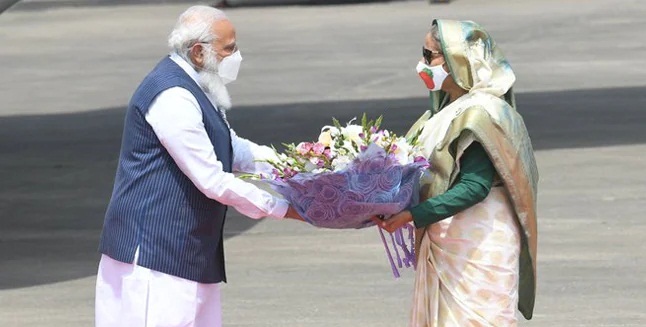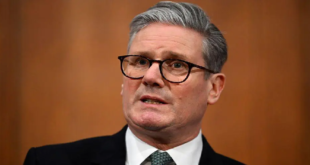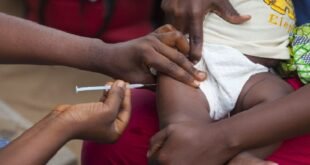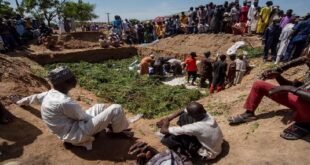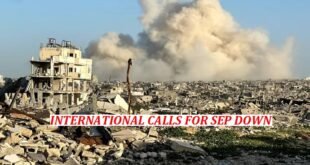26-03-2021
Bureau Report + Agencies
DHAKA/ NEW DELHI/ ISLAMABAD: Bangladesh police on Thursday fired rubber bullets and tear gas at hundreds of mainly student demonstrators who were protesting against an ongoing visit by Indian Prime Minister Narendra Modi.
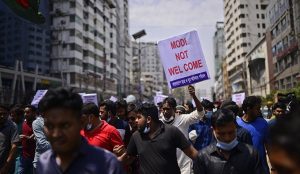 Police said the protest got out of hand as demonstrators marched in the capital Dhaka, with many throwing rocks and stones at officers, injuring dozens.
Police said the protest got out of hand as demonstrators marched in the capital Dhaka, with many throwing rocks and stones at officers, injuring dozens.
Indian Prime Minister Narendra Modi is in Bangladesh to attend its Golden Jubilee celebrations of independence and the birth centenary of Sheikh Mujibur Rahman, the country’s founder and father of current Prime Minister Sheikh Hasina.
Modi’s two-day tour to the Muslim-majority nation, starting on Friday, will cap Dhaka’s 10-day celebrations already attended by leaders from Sri Lanka, Nepal, Bhutan and the Maldives.
In the past week, several protests were held across Bangladesh to oppose the visit by Modi, who many Bangladeshis accuse of stoking religious tensions and 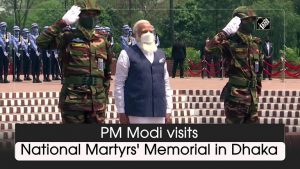 persecuting Muslims in India.
persecuting Muslims in India.
On Thursday, police in Dhaka fired rubber bullets and tear gas at hundreds of mainly student demonstrators protesting against the Hindu nationalist leader’s visit and criticizing the government for inviting him.
Police said the protest got out of hand as demonstrators marched in Dhaka, with many throwing rocks and stones at officers, injuring at least four.
“We fired tear gas and rubber bullets to disperse them… We have also arrested 33 people for violence,” police official Syed Nurul Islam told media on Thursday.
A spokesperson for the march said 2,000 mainly student protesters joined the demonstration.
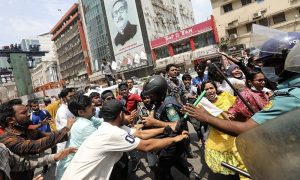 “Some 40 protesters were injured, including 18 hospitalized with injuries from police beatings and rubber bullets,” said Bin Yamin Molla, a senior official of the Student Rights Council, which organized the protest.
“Some 40 protesters were injured, including 18 hospitalized with injuries from police beatings and rubber bullets,” said Bin Yamin Molla, a senior official of the Student Rights Council, which organized the protest.
No protests have been reported so far on Friday.
At another protest outside the capital’s Baitul Mukarram mosque last Friday, protesters said more than 1,000 people, most of them Muslims, were killed in the Indian state of Gujarat in 2002, when Modi was the chief minister.
“His government has passed several laws which make Muslims a second-class citizen in India. We don’t want him here in Bangladesh,” Maulana Mamunul Haque, secretary-general of Hefazat-e-Islam, an Islamist political organization, told media.
 “A leader like him should not be allowed to attend the 50th Independence Day event.”
“A leader like him should not be allowed to attend the 50th Independence Day event.”
Even though Hefazat-e-Islam calls itself “non-political”, the Islamist organization has gained eminence after the fall of Jamaat-e-Islami, Bangladesh’s largest Islamist political party.
At the protest outside Baitul Mukarram mosque, Hefazat supporters slammed Modi for “killing Muslims in Gujarat, Kashmir, Delhi and other parts of India”. They took their shoes in their hands to show disrespect to the Indian leader.
Foez Ullah, president of the Bangladesh Students’ Union, said Modi’s policies go against the basic tenets of Bangladesh’s founding principles.
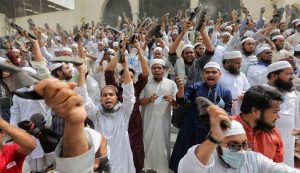 “Inviting India’s riotous, communal Prime Minister Narendra Modi to the golden jubilee of independence is against the spirit of the liberation war,” the group said in a statement.
“Inviting India’s riotous, communal Prime Minister Narendra Modi to the golden jubilee of independence is against the spirit of the liberation war,” the group said in a statement.
Protesters also criticized the killings of Bangladeshis by Indian border guards. India says such casualties happen when Bangladeshis are involved in cross-border smuggling and attempt to cross the border “illegally”.
Many Bangladeshis are also unhappy with India’s unwillingness to sign a water-sharing treaty for the Teesta River, one of many common rivers.
“Our rulers in Bangladesh call India as our friend but the BSF (India’s Border Security Force) is often shooting and killing our people on Bangladesh-India border,” Foez Ullah told media.
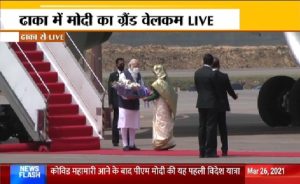 “Bangladesh has not yet received its fair share of Teesta water. Our rivers, ports, the Sundarbans are all victims of Indian aggression. India is interfering in internal affairs of Bangladesh politics.”
“Bangladesh has not yet received its fair share of Teesta water. Our rivers, ports, the Sundarbans are all victims of Indian aggression. India is interfering in internal affairs of Bangladesh politics.”
India helped Bangladesh gain independence from Pakistan through a nine-month bloody war in 1971. Dhaka and New Delhi have since shared close ties.
“Our partnership with Bangladesh is an important pillar of our Neighborhood First policy, and we are committed to further deepen and diversify it. We will continue to support Bangladesh’s remarkable development journey, under Prime Minister Sheikh Hasina’s dynamic leadership,” Modi said in a tweet late on Thursday ahead of his trip.
Earlier this week, Bangladesh’s Foreign Affairs Minister AK Abdul Momen 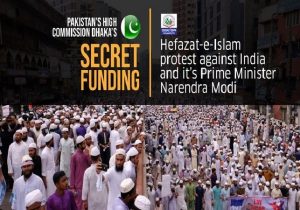 told media that since India helped Bangladesh achieve its independence, “so it is very natural that the Indian prime minister will be asked to become Bangladesh’s Golden Jubilee celebration’s main guest”.
told media that since India helped Bangladesh achieve its independence, “so it is very natural that the Indian prime minister will be asked to become Bangladesh’s Golden Jubilee celebration’s main guest”.
“We are not concerned what the fundamentalists are saying about Modi’s visit. They do not represent the voice of the country’s people,” he said, adding that “only a small fraction of people” were protesting.
“They are making an issue out of it without any valid reason,” he told media.
Imtiaz Ahmed, professor of international relations at Dhaka University, feels inviting Modi for the celebrations was “not a good choice”.
“Along with the Golden Jubilee, we are also celebrating the birth centenary of father of the nation. Sheikh Mujib fought for a secular nation whereas Modi is inherently communal. He (Modi) is criticized in his own country for his 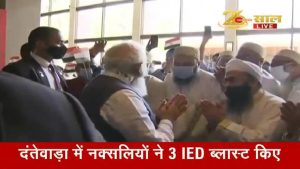 hardliner Hindu nationalist stance,” Ahmed media.
hardliner Hindu nationalist stance,” Ahmed media.
Ali Riaz, distinguished professor of politics and government at the Illinois State University in the United States, told Al Jazeera there was widespread discontent among a large number of Bangladeshis about the unequal relationship between India and Bangladesh.
“It is generally understood that India has enormous influence on the domestic politics of Bangladesh. BJP leaders’ derogatory statements about Bangladeshis and discriminatory policies of the Modi government have also compounded the situation,” he said.
 Pressmediaofindia
Pressmediaofindia
